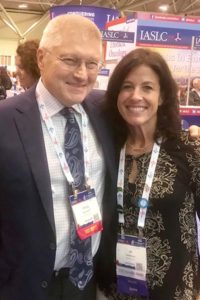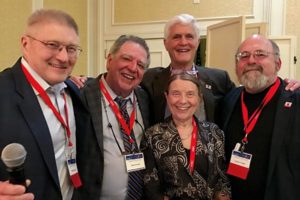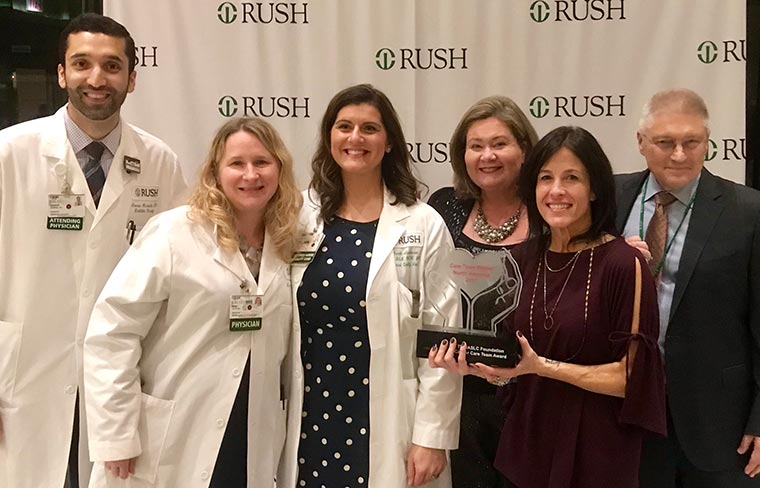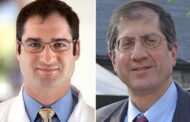
Philip D. Bonomi, MD, and lung cancer patient and advocate Jill Feldman during the 2018 World Conference on Lung Cancer in Toronto.
Care. A small word, perhaps. But it conveys much.
In the story of Philip D. Bonomi, MD, the word care is vital. His story cannot be told without care.
Dr. Bonomi—who will retire from his clinical service after 47 years in oncology at Rush University Medical Center, Chicago—is beloved for how much he cares.
You can see it in his 5-star online reviews, however the story is best told by his colleagues, patients, and friends.
For much of his career, lung cancer patients had few treatment options and little reason to hope.
Dr. Bonomi, who came to what was then called Rush-Presbyterian St. Luke’s Medical Center in 1975 as an oncology fellow, gave patients hope.
“There wasn’t a lung cancer community back then because people didn’t live long enough to become advocates,” said Jill Feldman, a lung cancer patient and advocate. “Despite it all, Dr. Bonomi always believed that lung cancer would become a manageable chronic disease. He is an eternal optimist.
“I’m not sure how he maintained hope for all those years, but I think it was his genuine care, patience, and compassion; all of which provided strength and instilled hope in his patients and their families. His patients have always known that whether it’s 5 a.m. or 9:30 p.m., the outside world stops existing for as long as we need him.”
Ms. Feldman, who is a co-founder of the EGFR Resisters advocacy group, lost two grandparents and her father to lung cancer at age 13. She later would lose her mom and aunt to lung cancer as well. She first met Dr. Bonomi when accompanying her aunt to an appointment.
“I remember how patient he was with all of us—me, my uncle, and a few cousins,” Ms. Feldman said. “He was genuine, kind, compassionate, and he answered all of our questions.”
That was 24 years ago. In the years since, Ms. Feldman has come to know Dr. Bonomi through their shared involvement in the LUNGevity Foundation and as a patient herself.
“I know I am alive and doing well today in large part because of Dr. B,” she said. “Throughout his career, his most cherished achievement and No. 1 endpoint has been helping his patients live longer and better.”
Indeed, in addition to his 5-star patient care, Dr. Bonomi’s contributions to science have helped the field come a long way since the days when patients had few options and little hope.

Philip D. Bonomi, MD; Robert Comis, MD; Paul Bunn, MD; Frances Shepherd, MD; and ILCN Editor Corey Langer, MD; pose during an event at a past IASLC Targeted Therapies of Lung Cancer meeting in Santa Monica, California.
He has written or co-written 270 scientific articles, 22 book chapters, and more than 270 abstracts and poster presentations. He served for more than 30 years on the Lung Steering Committee of the Eastern Cooperative Oncology Group, a National Cancer Institute-funded network of cancer centers and hospitals that collaborate on clinical trials.
Dr. Bonomi also served on the Medical Oncology Subspecialty Board of the American Board of Internal Medicine and has been a member of IASLC for more than 40 years. He has served on many IASLC committees.
You might say he leaves a big hole to fill. His successor would agree.
Timothy M. Kuzel, MD, FACP, who is the Samuel G Taylor III MD Professor of Oncology and chief of Hematology, Oncology, and Cell Therapy at Rush University Medical Center, said you can never replace a person like Dr. Bonomi.
“His departure will leave a deficit,” Dr. Kuzel said. “We’ll most miss his tremendous patient skill. How he takes care of families. No one does it like he does. There’s a reason he’s a legend. He’s one-of-a-kind in oncology.”
Dr. Kuzel said his goal is not to replace Dr. Bonomi.
ILCN Editor Corey J. Langer, MD, FACP, Professor of Medicine University of Pennsylvania, said he believes there’s no better person to hold up as an example than Dr. Bonomi.
“His departure will leave a deficit,” Dr. Kuzel said. “We’ll most miss his tremendous patient skill. How he takes care of families. No one does it like he does. There’s a reason he’s a legend. He’s one-of-a-kind in oncology.”
Dr. Kuzel said his goal is not to replace Dr. Bonomi.
“My goal is to hold him up as an example of what other clinicians should aspire to,” Dr. Kuzel said. “He is kind and helpful. He’s never anything other than gracious. I’m honored to follow in the footsteps of such a marvelous person.”
ILCN Editor Corey J. Langer, MD, FACP, Professor of Medicine University of Pennsylvania, said he believes there’s no better person to hold up as an example than Dr. Bonomi.
“Phil is one of my heroes and one the humblest, most accomplished thoracic oncologists I’ve ever met,” Dr. Langer said. “He’s been an inspiration to me throughout my career.”
Dr. Langer said he distinctly remembers when Dr. Bonomi made an impression while debating whether lung cancer should even be treated back in the mid-90s.
“Without question, Phil won the argument in favor of treating lung cancer,” he said. “And, of course, now we’re debating whether to give third-, fourth- or fifth-line treatment, so we’ve made a lot of progress. And a lot of that is due to his early work. His career spans the evolution of thoracic cancer care—from an era of skepticism to unbridled enthusiasm.”
His colleague Mary Jo Fidler, MD, who is chief of Medical Oncology at Rush, agrees. Dr. Fidler said she was fortunate to be assigned to work with Dr. Bonomi during her first year of fellowship, and that lucky circumstance certainly altered her professional trajectory.
“I remember going to meetings in those early years and being floored by his network,” Dr. Fidler said. “He invested so much in his fellows that his network includes countless outstanding leaders in oncology. He helped me connect with these leaders and ultimately to grow to be a leader in oncology myself.”






